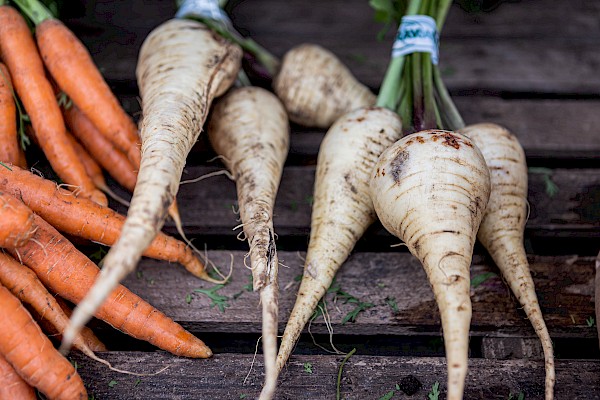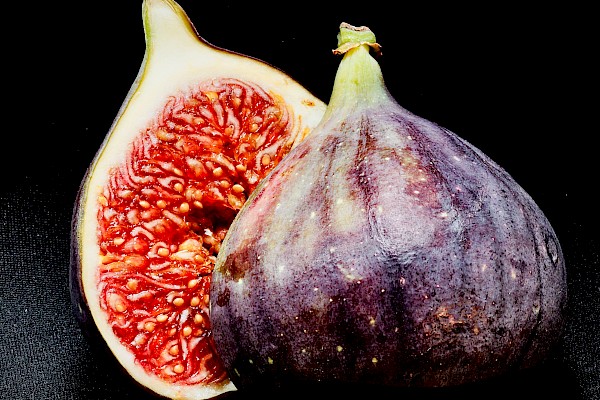Eat yourself happy
The dark days of winter are drawing closer, leaving many of us – particularly older people – feeling dejected. Maybe you are aware that you reach for chocolate or other sweet treats when you need comfort. This is a typical human reaction, because we frequently eat not only to satisfy our hunger pangs, but also because we are sad, bored, happy or stressed, or because we would like to switch off or reward ourselves. When we do this, we are attempting to create mental equilibrium by regulating our feelings.
You have very likely also experienced a good mood as a result of eating. But could food also prevent mental illnesses, or even alleviate them? How does food affect our moods, and which foods make us particularly happy?
To answer these questions, we need to take a quick tour of neuroscience and biochemistry, because various hormones and chemical messenger substances are responsible for our happiness.
Serotonin, tryptophan and amino acids
You have certainly heard of serotonin, the happiness hormone that plays a key role in neurophysiological metabolism; it is found in large quantities in cocoa, bananas, chocolate, nuts and pineapple.
Serotonin cannot cross the blood-brain barrier, which is why it must be synthesised in the brain from the amino acid tryptophan, which uses a carrier protein to cross the barrier. The cheeses Parmesan, Edam, Emmental and Brie are all very rich in tryptophan, and so are cashews, peanuts and soya products. The brain also needs magnesium and the B-vitamins niacin and pyridoxine to make serotonin from tryptophan. Because the various amino acids in our food compete to be absorbed in the brain, the quantity of tryptophan does not alone play a decisive role in being happy. What is important is the ratio of tryptophan to other amino acids.
Foods that make you happy
Foods that can make you happy therefore should contain a high quantity of tryptophan and, at the same time, low quantities of other amino acids. Proven examples of such foods are:
- Warm milk with honey
- Pasta with Parmesan
- Dark chocolate
- Dried figs
- Ripe bananas
The best overall amino acid ratio is found in dried dates. Although these foods contain a lot of tryptophan, just consuming them is not enough to become happier, because our personal happiness is also affected by other factors.
However, various scientific studies indicate that diet and certain foodstuffs may affect mental health.
Diet and mental health
To date, no scientific evidence proving a connection between diet and mental health has been found. However, several studies have reported a strong correlation between a balanced, healthy diet and mental wellbeing. A high consumption of fresh fruit and vegetables, for example, is associated with greater wellbeing and better mental health. What's more, the first scientific indications connecting diet with the risk of becoming depressed have been established. For example, a meta-analysis showed that a high consumption of “healthy foods”, defined as a diet with a high proportion of fruit, vegetables, fish and whole-grain products, is associated with a lower probability of depressive disorders. Furthermore, various meta-analyses indicate that a Mediterranean diet (daily consumption of fruit, vegetables, whole grains and dairy products, with olive oil as the main edible and cooking fat, moderate consumption of nuts, potatoes, eggs, poultry, frequent consumption of fish, occasional consumption of red meats, meals cooked from scratch, and avoiding processed foods) may have a protective effect against depression.
Tryptophan increases your tolerance of stress
Additionally, studies have shown that eating a low-protein diet may increase stress tolerance in people susceptible to stress. This is because the ingested tryptophan can act more effectively on serotonin production in the brain when a diet with a low protein-to-carbs ratio is followed. Consequently, people who are particularly prone to stress can positively influence their tolerance of stress with a low-protein, high-carb diet, and thus preventively counteract a depressive episode. To do this, make a point of eating cereal products, fruit and vegetables more frequently, and reduce your consumption of dairy, eggs and red meat.
Conclusion
Although we often feel that eating makes us happy, science has so far been unable to prove a direct link between foodstuffs and the emotions. Nevertheless, there are indications that we can benefit our health and wellbeing with a balanced Mediterranean diet. As we mentioned in our article on chocolate, many factors contribute to the positive mood boost that we may feel when eating certain individual foods.
Our happiness and mood are affected by many factors, including food. This means that a meal in a pleasant atmosphere, with friends or family, will benefit our mood, regardless of what is on our plates. What’s more, our mood demonstrably influences what and how we eat; stress and bad moods often result in poor food behaviour, as we turn more often to sweet treats and chocolate and also eat much faster than usual. It’s worth making a point of deliberately observing your food behaviour, and being aware of how you eat, what you eat and why you’re reaching for an apple or a chocolate bar right now. Christmas is coming, which means more and more sweet temptations. Try to eat consciously, to enjoy your food and to be mindful when choosing your meals and snacks.
References:
Adam, T. C. & Epel, E. S. (2007). Stress, eating and the reward system. Physiology & Behavior. 91(4).
Adan, R., van der Beek, E. M., Buitelaar, J. K., Cryan, J. F., Hebebrand, J., Higgs, S., Schellekens, H., & Dickson, S. L. (2019). Nutritional psychiatry: Towards improving mental health by what you eat. European neuropsychopharmacology: the journal of the European College of Neuropsychopharmacology, 29(12), 1321–1332.
Fresan, U., Bes-Rastrollo, M., Segovia-Siapco, G., Sanchez-Ville- gas, A., Lahortiga, F., de la Rosa, P. A. & Martinez-Gonzalez, M. A. (2019). Does the mind diet decrease depression risk? A comparison with Mediterranean diet in the SUN cohort. Eur. J. Nutr. 58, 1271–1282.
Laessle, R. G., Lehrke, S. & Dückers, S. (2007). Laboratory eating behavior in obesity. Appetite, 49(2).
Lai, J. S., Hiles, S., Bisquera, A., Hure, A. J., McEvoy, M., & Attia, J. (2014). A systematic review and meta-analysis of dietary patterns and depression in community-dwelling adults. Am. J. Clin. Nutr. 99, 181–197.
Markus, C. R., Olivier, B., Panhuysen, G. E., Van der Gugten, J., Alles, M. S., Tuiten, A., ... & de Haan, E. E. (2000). The bovine protein α-lactalbumin increases the plasma ratio of tryptophan to the other large neutral amino acids, and in vulnerable subjects raises brain serotonin activity, reduces cortisol concentration, and improves mood under stress. The American journal of clinical nutrition, 71(6), 1536-1544.
Psaltopoulou, T., Sergentanis, T. N., Panagiotakos, D. B., Sergentanis, I. N., Kosti, R., Scarmeas, N. (2013). Mediterranean diet, stroke, cognitive impairment, and depression: a meta-analysis. Ann. Neurol. 74, 580–591.
Siedentopp, U. (2014). Glücksnahrung – Essen und Psyche im westöstlichen Kontext. Deutsche Zeitschrift für Akupunktur.
Torres, S. J. & Nowson, C. A. (2007). Relationship between stress, eating behaviour, and obesity. Nutrition, 23(11-12).
Tuck, N. J., Farrow, C., & Thomas, J. M. (2019). Assessing the effects of vegetable consumption on the psychological health of healthy adults: a systematic review of prospective research. The American journal of clinical nutrition, 110(1), 196–211.
 subscribe to newsletter
subscribe to newsletter


